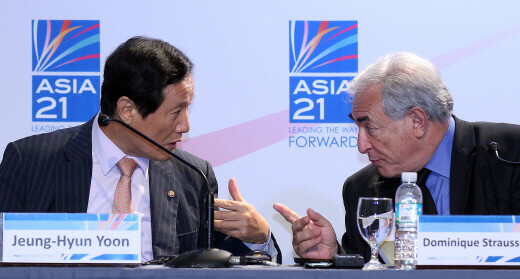hankyoreh
Links to other country sites 다른 나라 사이트 링크
IMF and Northeast Asian banks clash over West’s financial regulations

By Ahn Seon-hee
“It is almost like taking medicine for a sickness you don’t even have.”
“Sometimes you also have to take medicine for prevention.”
On Tuesday, the second day of an “Asia Conference” hosted by the International Monetary Fund and the Ministry of Strategy and Finance in Daejeon, opinions were divided between the IMF and participants over financial regulations that have been stepped up in the wake of the global financial crisis. The IMF actively defended the stronger regulations, but Asian countries, which had no major problems with their banks during the latest financial crisis, showed a tepid response. This represents a 180-degree turn from the Asian foreign exchange crisis over ten years ago, when the IMF “forced” Asian countries to relax their regulations.
“This crisis shattered the illusion that the West is always right,” said Peter Sands, chief executive of Standard Chartered Group, a bank that conducts business principally in Asia. However, Sands also said that the ideas presented to prevent another crisis from occurring are still centered on Western countries.
“If it makes a mistake, Asia could end up taking medicine for a disease it does not even have,” Sands said. “It is now important for Asia to have its voice heard.”
Also urging caution regarding increased regulations was Asian Development Bank President Haruhiko Kuroda, who said, “The Financial Stability Board has been moving to increase its capital ratio, but if that is the case, the bank’s expenses could increase and produce other side effects in the future.”
“Just because you did not catch the disease this time, there is no guarantee you won’t get it the next,” said IMF Managing Director Dominique Strauss-Kahn in an immediate counterargument. “Sometimes you need to take medicine for prevention.”
“What I have learned from this crisis, is that we need a global regulation system,” Straus-Kahn also said. “Otherwise, blind spots could arise in five or ten years, giving rise to even greater problems.”
China and Japan also expressed objections to a bank tax. This stemmed from concerns that stronger regulations could inhibit the growth of their own financial institutions. Meanwhile, the United States and European countries are actively pursuing regulations on their own banks, which generated the recent crisis through their reckless pursuit of profits.
Please direct questions or comments to [englishhani@hani.co.kr]
Editorial・opinion
![[Editorial] Does Yoon think the Korean public is wrong? [Editorial] Does Yoon think the Korean public is wrong?](https://flexible.img.hani.co.kr/flexible/normal/500/300/imgdb/original/2024/0417/8517133419684774.jpg) [Editorial] Does Yoon think the Korean public is wrong?
[Editorial] Does Yoon think the Korean public is wrong?![[Editorial] As it bolsters its alliance with US, Japan must be accountable for past [Editorial] As it bolsters its alliance with US, Japan must be accountable for past](https://flexible.img.hani.co.kr/flexible/normal/500/300/imgdb/original/2024/0417/6817133413968321.jpg) [Editorial] As it bolsters its alliance with US, Japan must be accountable for past
[Editorial] As it bolsters its alliance with US, Japan must be accountable for past- [Guest essay] Amending the Constitution is Yoon’s key to leaving office in public’s good graces
- [Editorial] 10 years on, lessons of Sewol tragedy must never be forgotten
- [Column] A death blow to Korea’s prosecutor politics
- [Correspondent’s column] The US and the end of Japanese pacifism
- [Guest essay] How Korea turned its trainee doctors into monsters
- [Guest essay] As someone who helped forge Seoul-Moscow ties, their status today troubles me
- [Editorial] Koreans sent a loud and clear message to Yoon
- [Column] In Korea’s midterm elections, it’s time for accountability
Most viewed articles
- 1[Column] The clock is ticking for Korea’s first lady
- 2[Editorial] When the choice is kids or career, Korea will never overcome birth rate woes
- 3S. Korea, Japan reaffirm commitment to strengthening trilateral ties with US
- 4Korea, Japan jointly vow response to FX volatility as currencies tumble
- 5[Guest essay] How Korea turned its trainee doctors into monsters
- 6Japan officially says compensation of Korean forced laborers isn’t its responsibility
- 7US exploring options for monitoring N. Korean sanctions beyond UN, says envoy
- 8Gangnam murderer says he killed “because women have always ignored me”
- 9[Editorial] As it bolsters its alliance with US, Japan must be accountable for past
- 10‘Right direction’: After judgment day from voters, Yoon shrugs off calls for change